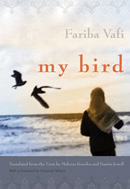
Books written by Middle Eastern women are commonly selected for translation into English because they contain elements both familiar and exotic: through their struggles with oppressive religio-political systems or dangerous intercommunal conflicts, the women in these books reveal themselves to be "just like us" in their hopes and aspirations. How refreshing then to pick up My Bird—a bestseller in author Fariba Vafi's Iran—which avoids these tired tropes and delves deeply into the psyche of one ordinary unhappy woman to create one of the most oddly compelling reads of the year.
Some readers may disagree, but this reviewer found My Bird to be an unrelentingly bleak and depressing novella. My Bird is a slight book, both in physical size and narrative scope. It is an almost overwhelmingly claustrophobic book that rarely leaves the confines of the narrator's series of small apartments and houses, which are generally stuffed with overbearing characters whose personalities crowd out the nameless narrator, whose "silence was considered [her] best asset."
The narrator—wife to a flighty and unfaithful husband, mother to two needy but otherwise un-extraordinary children—ruminates non-chronologically on her life, which is unfulfilling enough to merit passive-aggressive behavior but not soul-crushing enough to merit change, even when escape presents itself in multiple guises throughout her life. This inertia can variously be attributed to fear of the unknown, fear of being alone, fear of leaving home, or fear of social stigma, but only in part. Whether Vafi intended to or not, she created a character who seems unable to improve her situation because she thrives on the very dissatisfaction it produces. "I must be the most miserable for when I have had enough, I put my head on the stomach of the person with whom I am most fed up and listen to his stomach growl while feeling ashamed of my unhappiness," the narrator thinks to herself. It is only because the narrator says these things so straightforwardly—as though she is both aware and unaware of how much she allows herself to be defined by her suffering and self-pity—that I could feel sadness for her rather than irritation at her.
In the end, I don't quite know how to feel about this book. It is well-written and deeply sad
without ever verging into melodrama, but I didn't feel that it is anything more than a portrait
of one unhappy woman and her inability to become "unstuck". And while I didn't necessarily need
or even want some forced happy ending in which everything miraculously changes for her, I felt
a bit unsatisfied with a story consisting of little more than self-indulgent complaining. It
is perhaps worth noting that the translators provide an afterward to the book in which they
describe it as "the search for and the emergence of an individual female self and the liberating
potential of storytelling," in which the narrator "moves from an existential crisis to
self-awareness and self-revelation". Clearly, different interpretations are possible. I think
the book is most likely to appeal to readers who are interested in close character studies,
who may well find the excellent writing and ordinary-person point of view to be compelling.

Syracuse Univ. Press, hardcover, 9780815609445